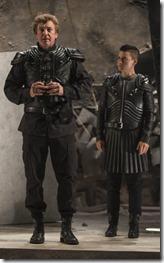
Compelling cast, design rise above disjointed, superficial 'Caesar'
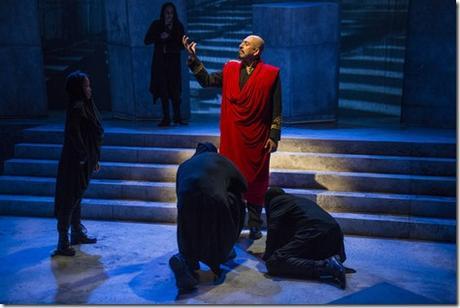
Review by Catey Sullivan
It's a dark and stormy night in the Rome during the opening scene of Writers Theatre's Julius Caesar . And on the off chance you overlooked the ominous tone pervading the looming, tilted pillars of the gray-scale set and hooded, shadowy figures arrayed like chess pieces across the stage, a videoscape of floods, fires and other apocalyptic disasters flickers over everything.
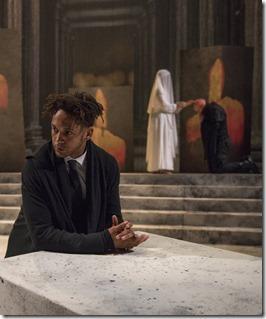
The production is occasionally intriguing, and visually arresting throughout. But the direction delivers a Julius Caesar that's condescending and disjointed. In scene after scene, the staging hammers the audience over the head with precisely what they should be feeling at any given moment. Not sure how the worm is turning as Mark Antony addresses the crowd at Caesar's memorial? Not to worry. As the "Friends, Romans, countrymen" speech winds on, a backdrop of floating emojis provides a simplistic pictorial explanation of the crowd's shifting allegiance. As the actors gaze down at their smartphones, the craft of acting is rendered unnecessary. Why bother with body language or facial expressions when you can just slap an avalanche of smiley/sad/angry faces over stage?
Then there's the video that plays when Antony speaks of the "unkindest cut." In the event that the words are unclear, the backdrop video is filled with images of bloody knives. And Caesar getting stabbed with bloody knives. And more bloody knives.
There's a similarly less-than-subtle approach when the production points out the parallels between 2016's election campaign and ancient Rome's Caesar-worship. Hmmm. Who might be the modern-day equivalent of Caesar's mindlessly-yelling sheep-like followers? Julius Caesar literally spells it out for you with signs the hordes hoist aloft, all proclaiming variations on "Caesar makes Rome great."
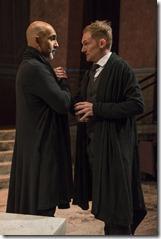
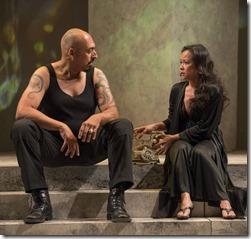
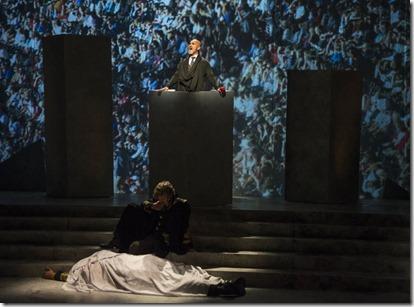
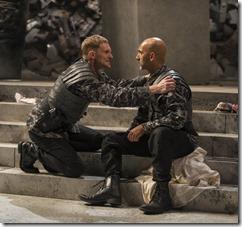
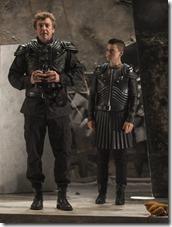
Thankfully, Julius Caesar isn't entirely a multi-media version of Shakespeare for Dummies. The cast is filled with actors of formidable talent. The adaptation centers on the relationship between chief conspirator Cassius (Parkinson) and his tormented convert, Brutus (Kareem Bandealy). Both actors are excellent, masters of both the words' haunting rhythms and intense emotion. Parkinson is ideally cast as the lean and hungry looking Cassius. He's got a gaunt, almost famished aspect that speaks not only to physical hunger, but to a bone-deep hunger to become a maker and unmaker of emperors. His mastery of the text gives the words a beautiful yet harrowing tone that's the stuff of nightmares and poetry.
Bandealy's Brutus is masterful, a compelling portrait of a man forever at war with himself, torn between the stabs of conscience and the gnawing, growing belief that Rome has fallen prey to a tyrant. When the conflict flickers across his face, it's with a high-def clarity equal to all those cinematic video streams.
Madrid St. Angelo's Caesar radiates the movie-star charisma the role requires, as well as the leader's increasingly out-of-touch belief that he is a god among men. St. Angelo's Caesar is like a fire to the moths of the Roman commoners, irresistible and dangerous. Also memorable are Christine Bunuanas Caesar's wife Calphurnia, a woman with agency and spine of steel even as she's desperately beseeching her husband to stay home on the Ides of March. As Brutus' wife Portia, Arya Daire is luminous, a daughter of Cato who knows full well that even her standing as Brutus' wife and her razor-sharp intelligence don't give her the power she needs to prevent tragedy.
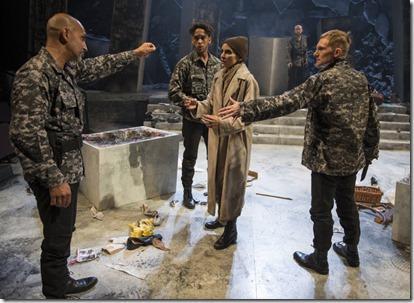
The first hour of Julius Caesar is by far the most compelling. Post-assassination, the production loses momentum and focus. The most striking element of the show's latter half is the remarkable transformation of set designer Courtney O'Neill's darkly beautiful streamlined towers, blocks and steps into a battle-scarred, burnt-out post-Apocalyptic wasteland covered in garbage and ashes. But the war that follows the assassination takes place largely off stage, and the discussions that track its progress are bloodless.
This is the portion of the piece that could use some fleshing out, especially with the character of Octavius Caesar (Sydney Germaine). Octavius essentially shows up out of nowhere to lead the battle against the conspirators. Why and how Octavius happens to be so suddenly leading Marc Antony's war remains largely a mystery; the character a cardboard cutout.
In the end, the most memorable elements of Julius Caesar are Mike Tutaj's cinematic video designs and O'Neill's impressively versatile set. As for the people who propel the tragedy? They're all too often reduced to emoticons and trapped in carefully calculated, obviously on-the-nose reflection of the most superficial elements of election season.
Julius Caesar continues through October 16th at Writers Theatre, 325 Tudor Court, Glencoe (map), with performances Tuesdays-Fridays at 7:30pm, Saturdays 3pm & 7:30pm, Sundays 2pm & 6pm. Tickets are $35-$80, and are available by phone (847-242-6000) or online through their website (check for half-price tickets at Goldstar.com ). More information at WritersTheatre.org. (Running time: 105 minutes, no intermission)
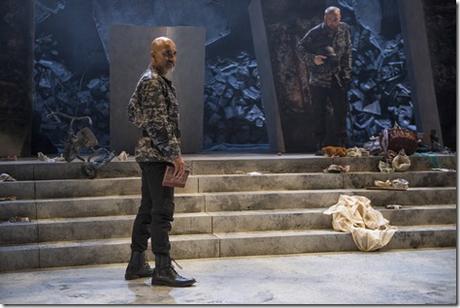
Kareem Bandealy (Brutus), Christine Bunuan (Calphurnia, Metella Cimber), (Portia, Decia, Soothsayer), Sydney Germaine (Cinna, Octavius Caesar), Matt Hawkins (Caius Ligarius, Lepidus), Thomas Vincent Kelly (Mark Antony, Trebonius), Julian Parker (Cobbler, Caska), Scott Parkinson (Cassius), Madrid St. Angelo (Julius Caesar), Sam Hubbard, Will Mobley, Andy Nagraj, Michael Perez, Tiffany Scott (understudies)
behind the scenes
Michael Halberstam , Scott Parkinson (co-directors), Courtney O'Neill (scenic designer), Mara Blumenfeld (costume designer), (lighting designer), Rob Milburn and Michael Bodeen (original music, sound design), (projections designer), Breon Arzell (movement director), Bobby Kennedy (dramaturg), David Castellanos (stage manager), Michael Brosilow (photos)
Tags: 16-0927, Andy Nagraj, Arya Daire, Bobby Kennedy, Breon Arzell, Catey Sullivan, Chicago Theater, Christine Bunuan, Courtney O'Neill, David Castellanos, Jesse Klug, Julian Parker, Kareem Bandealy, Madrid St. Angelo, Mara Blumenfeld, Matt Hawkins, Michael Bodeen, Michael Brosilow, Michael Halberstam, Michael Perez, Mike Tutaj, post, Rob Milburn, Rob Milburn and Michael Bodeen, Sam Hubbard, Scott Parkinson, Sydney Germaine, Thomas Vincent Kelly, Tiffany Scott, Will Mobley, William Shakespeare, Writers' Theatre
Category: 2016 Reviews, Adaptation, Catey Sullivan, William Shakespeare, Writers' Theatre

